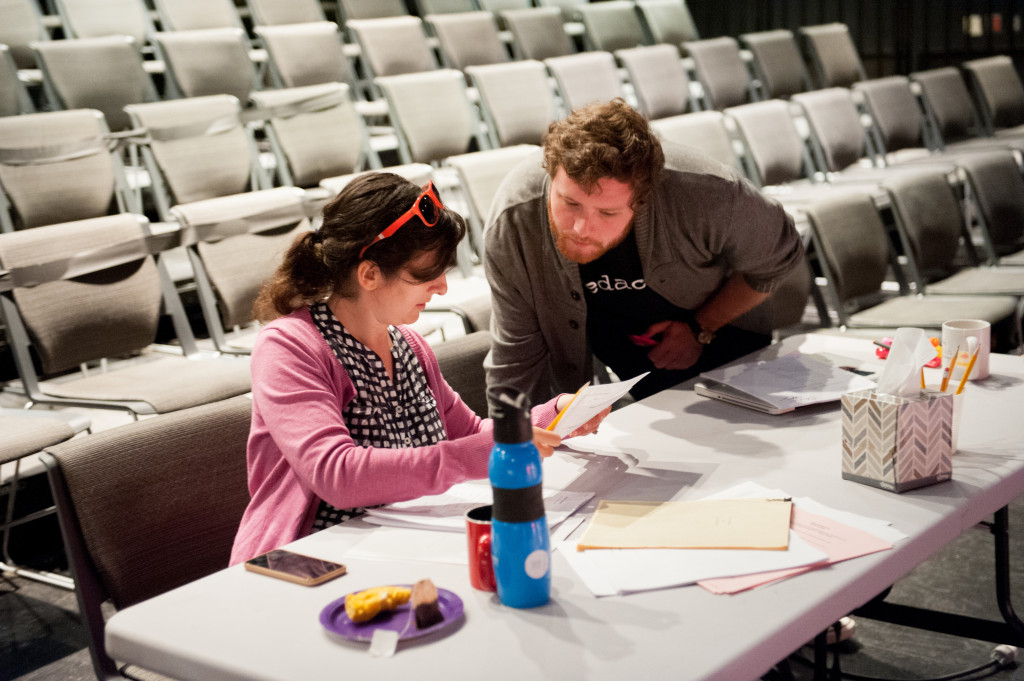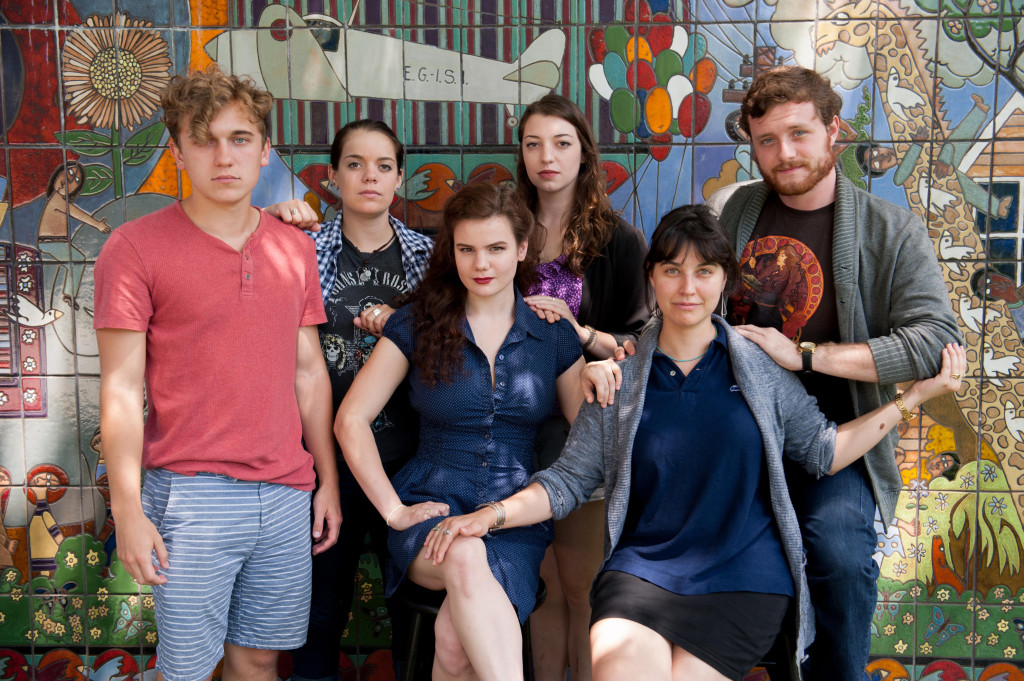Like many of the playwrights at the PlayPenn Conference, PlayPenn interns make major breakthroughs in the theater world after their involvement at the playwriting conference. Interns participate in a playwright’s workshop led by a professional playwright, culminating in the public presentations of their own plays, performed by conference artists. For more details, visit playpenn.org and apply by April 1, 2017.
In this three-part interview, Henrik Eger spoke to previous conference interns Anita Castillo-Halvorssen, Jillian (Jilly) Schwab, and Patrick Ross.

Playing at PlayPenn
Henrik Eger: One of the PlayPenn goals is to “provide as many resources and remove as many obstacles as possible.”
Jilly Schwab: The production team, including designers, dramaturgs, and directors, are steadfast in their commitment to the playwright. Very often, they would meet with their playwright after rehearsals to further a certain discussion or work on a problem encountered during rehearsal—anything to help the playwright tweak the work as concisely as possible.
AnitaCastillo-Halvorssen: PlayPenn’s designers are continually at work throughout the conference. Regarding my previous mention of David Jacobi’s design obstacles—The Widower design meeting was exhilarating in that each designer had clearly asked themselves, and each other, as many questions as possible about potential design obstacles that may arise out of the text. They succeeded in blasting away every one of them with the power of imagination and thorough research. Their skills were creative resources that the team could tap into to gain a whole new outlook on the play’s direction.
Patrick Ross: I think the free breakfast spread was one of the best resources we offered. Bagels and fruits of all colors, and free coffee and tea all day. Two weeks out, and Eric Pfeffinger is still tweeting about the bagels. I once saw Ellen Struve wander in just for a banana. It sounds so silly, but PlayPenn provided a place where the playwrights felt taken care of. They didn’t have to worry about making breakfast. They could focus on writing.
Henrik: Could you tell us more about your experience with your playwright?
Jilly: Genne [Murphy] was endlessly inspiring for me.She knows what resonated, what needed more clarification, and what to stay true to. I’m always intrigued when a playwright has no problem with “killing [their] darlings,” as the adage goes.
Anita: David [Jacobi] pulled me aside one day after rehearsal and asked, “Is there a reason you are being quiet?” In spite of my silence, somehow he could tell that I’m not really the “quiet” type. When the interns arrived at PlayPenn, Paul and Michele encouraged us to spend our energy listening and observing, rather than calculating how best to express our thoughts to a whole group of artistic professionals.
By adopting this method, I was already learning so much from my team members that I hardly noticed that I wasn’t expressing myself enough to those who would appreciate my feedback—in this case, David. From then on, if I ever had burning questions, thoughts, or emotions bubbling up about Widower, David and I would use our lunch breaks to discuss the text and all it can do.
Patrick: James Ijames is a virtuoso and a gentleman. He invented some of the play’s cleverest lines on the spot. It takes someone truly talented to write like that. He was also very receptive to my voice in the room and invited me to speak. I’m grateful for that, because it made me feel like a real contributor to the process and to the play itself.
Henrik: Overall, how would you describe the PlayPenn process and its impact on your professionalism? What were some of the best insights you gained from the PlayPenn team?
Anita: Dramaturg Elaina Di Monaco assured me that more experienced professionals will often be thinking the same thoughts as the interns. Yet, the playwrights understand how best to articulate these thoughts efficiently and respectfully. This was the most significant learning process I underwent at PlayPenn.
Patrick: I took to slipping Elaina notes with my thoughts, so she could determine the appropriate time to bring them up. Timing is everything: a great idea at the wrong time can be a travesty. That was a very interesting and crucial lesson for me.
Overall, PlayPenn impressed upon me the importance of the team. When everyone has the interests of the play at heart, and not their own professional ambitions, magic happens.
Jilly: I had the tremendous opportunity to work with PlayPenn since the winter of last year, so I got a larger sense of their operations. From the playwright application process, to casting, to Conference, the process puts the playwright at the helm.
Before the conference began, I also read a few of the semi-finalist plays. It was quite an education to see how many scripts PlayPenn receives each year. I felt I read with more careful attention and with a better eye for a script’s potential [than before].
PlayPenn facilitates pure focus on the writing itself, while also understanding fluctuations in development. I think the best insight I’ve gained is being versatile, open to change, and being ready to start from square one if need be.

Under the Microscope
Henrik: Could you give some examples where you saw the PlayPenn team “executing all of [their] activities with honesty and directness”?
Ross: When offering critiques, the PlayPenn rule is to baldly request permission first: “I have a suggestion about Balkonaé’s personality in Scene 2, would you like to hear it?” It is the playwright’s prerogative to accept or deny.
Jilly: When it came to the plays themselves, I was almost taken aback by that same directness. For example, a few of the plays were structured with jumps in time. Tracking the meat of the story was difficult at times, and there was no shame or coyness in pointing out a gap in the plot.
Anita: The best example I have is from actors, who constantly ask the playwright, “Why does the character do that?” Sometimes, the response to this question has no concrete answer, but their hunger for a dramaturgical logic in the text helps playwrights think further about the rules of the worlds they have crafted.
Henrik: If there were moments where your role as an intern moved into a different direction than you had anticipated, how did you handle any possible misunderstandings, and how did they impact the perception of yourself and your actions within a fast-paced environment?
Jilly: Here’s where that “naïve intern” stigma lies! The other interns and I discussed this a few times. I definitely consider myself embryonic amongst these amazing professionals. I think my acknowledgment of that helped. I simply haven’t acquired the experience yet to comment as constructively to the process. The pacing of the environment was helpful in that there simply wasn’t time to mull over every time I made a mistake.
Anita: In the middle of my time with PlayPenn, I felt I wasn’t doing enough for the Widower team. I felt confused about my role in the rehearsal room, and wondered what more I could do within the collaborative process. Michele [Volansky] guided me through that feeling, reminding me that some processes don’t always require what we hope they require of us as team members. Sometimes, the development process asks us solely to be a supportive presence throughout.
Patrick: There was one terrifically idiotic suggestion I made—I don’t remember the details, unfortunately—but it was neither ridiculed nor lambasted. James [Ijames] simply said, “Hmmm, don’t think so,” and we moved on.
Henrik: While the intensive work might have been stressful at times, were there any funny moments?
Jilly: My favorite was the playwriting master class with Lauren Feldman. The free-writing and ten minute plays that we created unlocked much about ourselves to one another. We got glimpses of what each of us has in our creative and crazy minds. That was a privilege.
Anita: Our workshops with [playwright] Lauren Feldman always took place very late in the evening, sometimes running until past 10 PM. The interns were often a little giddy with fatigue under these circumstances, so whenever Lauren asked us to read a humorous text aloud as a group, we usually found it extra humorous. A favorite moment from these loopy times is the night we read aloud Wil Kauffman’s short intern play, Match Made In. Even Wil was laughing hysterically at his own jokes. Our intern team was brilliantly funny.
Patrick: If you saw White, you know that there’s a minimum of one joke per page in that play, and usually more. We never stopped laughing at those jokes, mostly because James didn’t. And better yet, the actors consistently reinvented the humor. Joniece Abbott-Pratt is an inspired performer. She even twisted James’s jokes until they were ungodly funny.
Read the other two group interviews with the PlayPenn interns:
- Part 1: What theater students do behind the scenes.
- Part 3: When young theater people come into their own.
Read interviews with PlayPenn’s Artistic Director Paul Meshejian:
